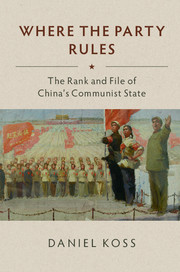Book contents
- Frontmatter
- Contents
- List of Figures
- List of Tables
- Acknowledgments
- PART I AUTOCRATIC GRASSROOTS POLITICS
- PART II THE PARTY IN CONTEMPORARY CHINA
- PART III THE PARTY'S ORIGINS
- PART IV THE PARTY IN THE MAO ERA
- 7 Can the CCP Disobey? The Great Leap Famine (1958–1961)
- 8 The CCP and Regime Survival in Times of Crisis (1967–1969)
- 9 Conclusion
- Appendix 1 Party-versus-Bureaucracy Model
- Appendix 2 Party Growth Model
- Notes
- Primary Material
- Secondary Sources
- Index
9 - Conclusion
from PART IV - THE PARTY IN THE MAO ERA
Published online by Cambridge University Press: 21 April 2018
- Frontmatter
- Contents
- List of Figures
- List of Tables
- Acknowledgments
- PART I AUTOCRATIC GRASSROOTS POLITICS
- PART II THE PARTY IN CONTEMPORARY CHINA
- PART III THE PARTY'S ORIGINS
- PART IV THE PARTY IN THE MAO ERA
- 7 Can the CCP Disobey? The Great Leap Famine (1958–1961)
- 8 The CCP and Regime Survival in Times of Crisis (1967–1969)
- 9 Conclusion
- Appendix 1 Party-versus-Bureaucracy Model
- Appendix 2 Party Growth Model
- Notes
- Primary Material
- Secondary Sources
- Index
Summary
China's authoritarian government has been successful in exercising authority over much of the vast East Asian landmass, partly because it was able to take advantage of the grassroots presence of its Leninist party organization. The one-child policy, one of the most ambitious policies of the twentieth century, could not have been so effectively implemented if it had not been for the CCP's rank and file, present in the villages and the factories throughout the country. Similarly, tax collection benefits from the presence of party members at the grassroots level. In fiscal terms, the costs of party members’ informal privileges are small compared to the gains associated with the activities of local party members. In the cities and in the countryside, across various types of tax revenues, party members help to increase taxation rates, substantively contributing to the material base of the People's Republic by alleviating asymmetric information problems. Having a strong party presence at the grassroots helps enforcement.
The central claim that the party's rank and file functions as faithful implementers, deployed for tasks of the highest priority, must be refined in two respects. First, historically, the Great Leap Forward appears as an instance when, rather than enforcing central policy, the most committed party members resisted it. This was possible only because at the time the CCP had not yet entirely morphed from a revolutionary party to a party in power. Less than ten years after risking their lives for the Communist cause, some party members retained a strong revolutionary commitment, which motivated the high-risk behavior of foot-dragging. In a very limited way, revolutionary zeal allowed the party to function as a self-corrective device, although on the whole resistance was rare and could not prevent tens of millions of deaths. Second, another refinement concerns the function of the party in times of crisis, when rank-and-file members go far beyond their ordinary role of implementing policies. During the severe turmoil of the Cultural Revolution, when Mao called on ordinary people to attack the institutions of the party state, CCP members were left without clear instructions.
- Type
- Chapter
- Information
- Where the Party RulesThe Rank and File of China's Communist State, pp. 309 - 316Publisher: Cambridge University PressPrint publication year: 2018



